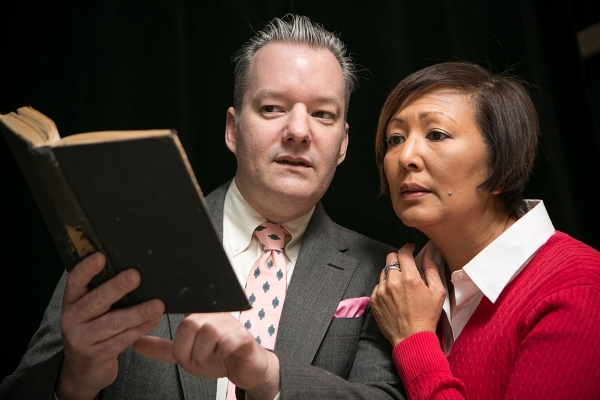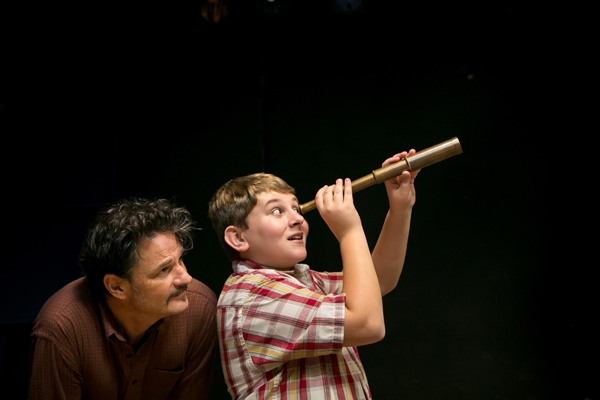Sitting in the Deep Dish Theater on Friday, waiting for the start of “Arcadia,” I overheard a woman in the row in front of me.
“I looked up ‘Arcadia’ on Wikipedia before we came,” she said to her companion. “And thank God I did, because I probably wouldn’t have a clue what was going on otherwise.”
So it goes with “Arcadia,” Tom Stoppard’s sweeping, breathtaking magnum opus about knowledge, science, history and fate, now playing at the Deep Dish through March 22. Expertly directed by Paul Frellick (DD’s artistic director) and beautifully acted by a cast of twelve, it’s an absolute must-see—but your brain better come ready to work overtime.
Here’s the Wikipedia entry on “Arcadia,” incidentally.
To understand “Arcadia,” start with Tom Stoppard. Born in Czechoslovakia in 1938, he fled the Nazis with his family and traveled to Singapore, Australia, India, and finally England—picking up a world of perspective and insight along the way. His plays—“The Real Inspector Hound,” “Rosencrantz and Guildenstern Are Dead,” the screenplay for “Shakespeare In Love”—are ruminations on the human condition, the nature of art, the certainty/uncertainty of knowledge, and the thin line separating reality from theater. (Are those four things all one and the same?)
And “Arcadia” is his masterwork. Set in a single room in Sidley Park, an English aristocratic estate, the play jumps back and forth in time between the present day—where three scholars are trying to unravel a historical mystery tangentially involving the poet Lord Byron—and the early 1800s, where we see the events play out as they happened. (Byron himself never appears: turns out he’s not as important to the plot as the modern-day scholars think he is.)
What’s happening? Well, in 1809, we follow a teenage girl, Thomasina Coverly (Nicole Gabriel), and her tutor, Septimus Hodge (Ryan Brock). Thomasina is a genius: like any teenager, she’s curious about “carnal embrace,” but she’s also about to discover the second law of thermodynamics decades before its time. What is the second law of thermodynamics? Entropy, the inescapable process by which things irreversibly break down. What is done cannot be undone, and order necessarily decays into chaos (this is paralleled by Sidley Park’s garden, which—off-stage—is being remodeled from its Enlightenment-era neat geometry into a rough, naturalistic, Romantic-era wildness). Eventually the pair realize the ultimate implication of Thomasina’s discovery: all the stars will flicker out and the universe will settle into a lifeless equilibrium. “We’re doomed,” says Septimus.
Meanwhile, in the present day, two scholars, the hilariously pompous Bernard Nightingale (Eric Carl) and the no-nonsense Hannah Jarvis (Dorothy Recasner Brown), join forces—reluctantly, as they dislike each other—to investigate Sidley Park’s documents in order to determine whether Lord Byron killed a fellow poet in a duel. Red herrings lead them astray—Hannah, for instance, misinterprets a doodle of Thomasina’s, and Bernard wrongly assumes that Byron wrote an essay that we know was written by Septimus—but gradually, very gradually, the truth (or most of it) comes out.
Also, romantic entanglements abound. By the end of the play, Septimus has been involved or nearly involved with three different people (one of them never seen); Bernard, Hannah and Thomasina have each been involved or nearly involved with two. And there are nine other characters I haven’t even mentioned yet. There’s a lot going on here.
Eric Carl is Bernard Nightingale and Dorothy Recasner Brown is Hannah Jarvis. (Photo via DeepDishTheater.org.)
Deep Dish’s production of “Arcadia” is tremendous. The set is deceptively simple—a large table, a few chairs, three doors and some windows, that’s all, but you feel the presence of the house, the gardens, the estate, the swirl of life both on and off stage. The leading actors disappear into their characters—I loved Ryan Brock’s wry Septimus and Dorothy Recasner Brown’s Hannah, and Eric Carl steals the show as Bernard (Bernard delivering his paper in the second act is a tour de force)—but the rest of the cast shines as well: notable are David Godshall as the clueless poet Ezra Chater, Erika Edwards and Adam Sampieri as the brilliant modern-day siblings Chloe and Valentine, and Nicole Gabriel (a high-schooler!) as Thomasina. The relationships between these characters are very delicate—the earliest buds of a romance between Septimus and Thomasina, the love/hate romantic-professional partnership between Bernard and Hannah—and it’s all performed so smoothly that the difficulty doesn’t even register. “Arcadia” requires its actors to shift back and forth, often mid-scene, between virtually every imaginable stage of romance—while simultaneously ruminating on life, death, science, art, history, mathematics, landscape architecture, botany, poetry, and fate—and each of the twelve actors here is more than up to the task.
And then there’s the play itself. What are the themes? Start with the title. “Arcadia” is a reference to the Latin phrase “Et in Arcadia ego,” or “Even in paradise, there am I.” The “I” is death: looming over the play is not only Thomasina’s discovery about the eventual decay of the universe, but also our advance knowledge of Thomasina’s own death—coupled with the end of the Enlightenment, symbolized by the remodeled garden, plus the fact that all the events of 1809, so important to the characters then, will either be forgotten or misinterpreted by history, even when intelligent people are actively trying to piece them all together. (The recurring motif is fire. Pay attention to fire.) It’s all very pessimistic. Or is it? The chaos which violates order is romantic love, “carnal embrace.” The play ends with a dance that reaches across centuries. And while Thomasina argues that things done cannot be undone, Septimus counters that knowledge lost can be regained—a theory that’s apparently confirmed by our present-day scholars, who manage to rediscover the truth almost in spite of themselves.
All of which is to say: good Lord, this play is smart. My friend and I walked out of “Book of Mormon” last week remarking how intelligent a play that was—but “Arcadia” operates on a whole other level. It’s the most intelligent play I’ve ever seen. The best? Well, not quite. But definitely the smartest.
“Arcadia” is two and a half hours long and doesn’t waste a second. There’s a phenomenal amount of dense dialogue here; if there’s a flaw in the production at all, it’s that the actors will occasionally stumble over one or two of their hundreds of lines. (But that’s just probability theory.) The knock on Stoppard, if there is one, is that his plays appeal to the head without appealing to the heart—and yes, there’s an extent to which that’s true for “Arcadia.” Stoppard is writing at the top of his game; there are thirteen characters in the play (one actor plays a double role), and by my count, at least six are certifiable geniuses. Probably seven. Maybe eight.
So yes, it’s not an easy play. (Between the two, I found myself more emotionally moved by “Book of Mormon,” a play that actively goes out of its way not to strike an emotional chord.) But you ought to see “Arcadia,” not in spite of its difficulty but because of it. You ought to see this play because it’s brilliant, because it will make you think, because it will make you smarter for having seen it. Its very intelligence will move you.
Will that motion fade? Yes, eventually.
But man, it’s worth it in the meantime.
“Arcadia” runs at the Deep Dish Theater (in University Mall) through March 22. Visit this link for tickets.




Comments on Chapelboro are moderated according to our Community Guidelines